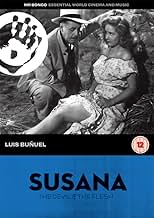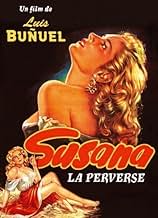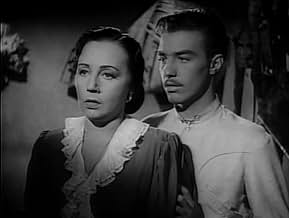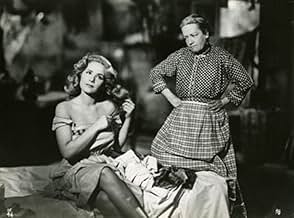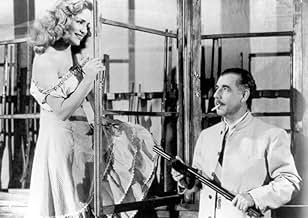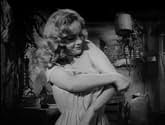अपनी भाषा में प्लॉट जोड़ेंAn unstable young woman escapes from a reformatory for seriously wayward girls and deceptively finds shelter in the kind home of a frighteningly nice and decent family. Little by little, she... सभी पढ़ेंAn unstable young woman escapes from a reformatory for seriously wayward girls and deceptively finds shelter in the kind home of a frighteningly nice and decent family. Little by little, she causes unrest and discord among the members of the household until they are all fighting ... सभी पढ़ेंAn unstable young woman escapes from a reformatory for seriously wayward girls and deceptively finds shelter in the kind home of a frighteningly nice and decent family. Little by little, she causes unrest and discord among the members of the household until they are all fighting with one another.
- पुरस्कार
- कुल 1 नामांकन
- Empleado de Guadalupe
- (बिना क्रेडिट के)
- Empleada de Guadalupe
- (बिना क्रेडिट के)
फ़ीचर्ड समीक्षाएं
** 1/2 (out of 4)
Bunuel's remake of the 1929 American film The Squall centers on Susana (Rosita Quintana), a mentally unstable woman, who escaped from a reformatory and gets shelter from a kind and caring family. Pretty soon Susana is turning on the sexuality and starts to make the family turn against one another. The original movie is perhaps the worst Hollywood film I've seen from that era so it didn't take too much for this movie to pace it up. With that said, I think overall this is a pretty disappointing film from the director but I'm really not sure if he could have done anything different to make it better. To me, this story just doesn't work because it's just so over dramatic that you can't help but role you eyes at all the "tragedy" that befalls the people around Susana. The only thing this movie tells you that men are dumb and can be changed due to a woman's sexuality. This really isn't too dramatic and in the end the movie begins to drag. Another problem I had with the film is that the characters were all pretty annoying and that includes the old aunt who is constantly screaming religious sayings. I'm not sure if Bunuel made her so over the top for laughs or if this was just his way to go against Christians. Even with all that said this is still a beautiful film to look at with some great cinematography. The performances are also good but I was expecting better considering the director. Quintana is great and really steals the film as she plays the innocent virgin to trick the family very well and on the blink of a dime she can turn into the slut. Fernando Soler is also very good as the head man of the home.
She is brought into a dark and sinister cave which is teeming with rats and spiders. We know nothing about the reasons for this punishment and we can't avoid feeling sorry for her: Whatever she might have done, it does not justify an inhuman treatment such as this.
Susana is religious, and the god she calls on is kind and generous. So the miracle happens, the bars of the prison cell at which she is rattling suddenly give way and she succeeds in escaping into a night full of darkness and relentless rain.
She even can make it into paradise: A landowner's family takes her in, after she has told them a pack of lies. She is allowed to work as a maid and gains the confidence and the affection of the mother, while the father at first has a disapproving attitude towards her.
But the family's son and the steward live on the estate, too, and they don't fail to notice Susana's outstanding physical attraction. As the girl also knows how to place her charms, they both fall victim to her.
Susana, however, does not seem capable of developing any true feelings. Life is just a villainous game for her in which the rules are set by herself. The aim is to destroy the well established order. When finally even the landowner succumbs to the lure of love the initial situation becomes reversed and nothing stays the same: the mother turns into an enraged enemy, while father and son become rivals and the steward is dismissed.
It is then the latter who sets the decisive ball rolling which leads once more to a reversal of the circumstances: He finally makes use of his knowledge of Susana's escape from the reformatory, which up to now he kept to himself in order to increase his chances of winning Susana's favor, and Susana, however fiercely she may be defending herself, cannot avoid being arrested.
The game is lost, and, as it often happens in a melodrama, it is the refused lover, who makes it break down. In the end, the episode with Susana means nothing more than the memory of a nightmare for the landowner's family. And, after the re-establishment of the initial situation, the characters cannot help asking themselves if everything has really happened.
The attentive spectator will come to a different conclusion. He will notice the fundamental fragility of an order that is well established only in appearance. And he will not be able to avoid drawing a frightful parallel to his own life, in which nothing is secure and reliable either.
In fact, the movie itself is grounded on a surreal precondition, in the opening scenes, Susana is locked up in a solitary cell, she entreats God in front of a cross materialised by the shadows of the metal bars, to give her a way out since she can not change her nature, which is made by God himself, so God grants her wish, as if he wants to cast a prank on us, releases the snake into the Garden of Eden. The script runs formulaic-ally where three different types of men all become the victims of Susana's seduction, Rosita Quintana successful captures her carnal allure with crude histrionics, for the spunky Jesús, she is the unattainable wench who promises him something sweet but refuses his pushing courtship; for the bookish Alberto, she is a proactive seductress from whom he is too green to resist, and for the patrician Guadalupe, she becomes a damsel in distress, who inadvertently rekindles his sexual urge which a married middle-age man can no longer obtain from his wife. While men are succumbing to their primitive lust, after seeing through her veiled pretence, Carmen and Felisa strike up, only that would be too late if Buñuel had opted for a more sinister finale.
The happy ending is a policy of appeasement, even the mare miraculously regains its vitality, but the re-gained conformity and harmony appear so ironic thanks to Buñuel's poker-faced mockery - how simple a weed in the field can bring about moral corruption to a conventional middle-class family. SUSANA is a fetching microcosm of Buñuel's views on human frailties, unambitious, simple but integral and surprisingly gratifying.
The film is also a major departure for actor Fernando Soler playing the role of the rich landowner who gives a tepid performance compared to the one he gave in the other Bunuel film "The Great Madcap" (1949) made 2 years before this film.
The movie is well worthy thanks to razor-sharp performances as well as certain critical revealing the hypocrisies of modern society , in which a wayward girl uses the power of manipulation and eroticism to get her dark purports and eventually causing distresses until they are virtually struggling with each other . The picture features exceptional work by Rosita Quintana , she's magnificently charming as well as hateful playing the insidious Susana who attempts to dissect the harmonious family group . Her acting result to be a phenomenal precedent to the character who played Sue Lyon in ¨Lolita¨ or Carrol Baker in ¨Baby Doll¨ . The baddie female is really a selfish young , a manipulating babe who hates and seduces , as well as uses her feminine wiles to tempt all around . Furthermore, a beautifully cinematography in subdued black and white by José Ortiz Ramos , being shot , as usual , in Estudios Churubusco Azteca, Mexico City, Distrito Federal, Mexico. And atmospheric and appropriate musical score by Raúl Lavista.
The motion picture was competently directed by Luis Buñuel , belonging to his Mexican period and it won Ariel Awards, Mexico 1952 and Nominee Silver Ariel Best Young Actor Luis López Somoza . After shooting Spanish and French films as "Un Chien Andalou" (1929) , and ¨Age of Gold¨(1930) , ¨Hurdes tierra sin pan¨ (1936) , Buñuel went on his Mexican period in which he teamed up with producer Óscar Dancigers and after a couple of unmemorable efforts shot back to international attention with the lacerating study of Mexican street urchins in ¨Los Olvidados¨ (1950) , winning him the Best Director award at the Cannes Film Festival . But despite this new-found acclaim, Buñuel spent much of the next decade working on a variety of ultra-low-budget films, few of which made much impact outside Spanish-speaking countries , though many of them are well worth seeking out . As he went on filming "The Great Madcap" , ¨The brute¨, "Wuthering Heights", ¨El¨ , "The Criminal Life of Archibaldo De la Cruz" , ¨Robinson Crusoe¨ , ¨Death in the garden¨ and many others . And finally his second French-Spanish period , usually in collaboration with producer Serge Silberman and writer Jean-Claude Carrière with notorious as well as polemic films , such as : ¨Viridiana¨ , Tristana¨ , ¨The Discreet Charm of the Bourgeoisie" and his last picture , "That Obscure Object of Desire" . Susana rating : 7.5/10 . Essential and indispensable seeing for Luis Buñuel aficionados.
क्या आपको पता है
टॉप पसंद
- How long is Susana?Alexa द्वारा संचालित
विवरण
- रिलीज़ की तारीख़
- कंट्री ऑफ़ ओरिजिन
- आधिकारिक साइट
- भाषा
- इस रूप में भी जाना जाता है
- Susanna - Tochter des Lasters
- फ़िल्माने की जगहें
- उत्पादन कंपनियां
- IMDbPro पर और कंपनी क्रेडिट देखें
- चलने की अवधि
- 1 घं 26 मि(86 min)
- रंग
- पक्ष अनुपात
- 1.37 : 1

